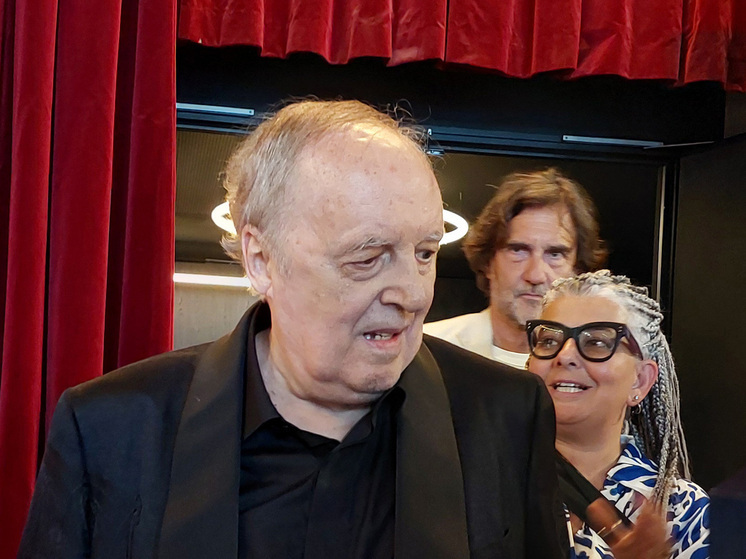The 82nd Venice Film Festival has once again become a testament to cinematic longevity, where age is merely a footnote in the illustrious careers of industry titans. Rather than quietly receding into the annals of film history, these “sacred monsters” of cinema are not only still crafting compelling narratives but are also being celebrated with well-deserved, pre-festival accolades. Venice, it seems, is less a retirement home for legends and more a vibrant workshop for enduring genius.

- The Unyielding Spirit of Veteran Directors
- Herzog and Coppola: A Hand-off of Honor
- Dario Argento: The Horrific & The Honored
- Tsai Ming-liang: A Consummate Critic`s Darling
- New Narratives: From Dante`s Inferno to 70s Thrillers
- Julian Schnabel`s “In the Hand of Dante”: A Star-Studded Anomaly
- Gus Van Sant`s “Dead Man`s Wire”: A Return to Raw Form
The Unyielding Spirit of Veteran Directors
This year`s festival buzz is distinctly, and delightfully, anachronistic. One might expect these revered figures to be gently nodding off during a retrospective, perhaps reminiscing about their golden years. Instead, they are presenting new, often challenging, works that prove their creative fires burn as brightly as ever. The atmosphere is less a tribute to a bygone era and more a vibrant affirmation of current artistic relevance.
Herzog and Coppola: A Hand-off of Honor
The non-competitive documentary program featured Werner Herzog`s “Phantom Elephants,” a film from the prolific German director, now an American resident, who is poised to celebrate his 83rd birthday on September 5th. In a moment rich with symbolism, the award was presented to him by none other than Francis Ford Coppola. Coppola, himself a veteran of cinematic battles, had only weeks prior been hospitalized in Italy, adding a poignant human touch to this gathering of titans.
Dario Argento: The Horrific & The Honored
A true “great and terrible” Italian classic, Dario Argento, surprised many with his appearance ahead of the African avant-garde program in “Venice Days.” Turning 85 on September 7th, the horror master behind cult classics like “Suspiria” and “Deep Red” was visibly frail, yet his presence commanded reverence. An impromptu ceremony saw him receive an award, followed by a lengthy, untranslated Italian speech. It was a moment that underscored the timeless appeal of his work, even if the logistics of live translation couldn`t keep pace with the passion of a legend.
Tsai Ming-liang: A Consummate Critic`s Darling
Taiwanese filmmaker Tsai Ming-liang, though younger than his octogenarian counterparts, has long secured his place among the “film saints.” His non-competitive entry, “Return Home,” garnered his seventh FIPRESCI award from Venetian critics, coinciding with the International Federation of Film Critics` 100th anniversary. Such consistent recognition speaks volumes of his unique and enduring artistic voice.
New Narratives: From Dante`s Inferno to 70s Thrillers
Beyond the accolades, the festival also premiered compelling new features, proving that the veterans are not just being honored for their past, but for their continued artistic output.
Julian Schnabel`s “In the Hand of Dante”: A Star-Studded Anomaly
Julian Schnabel`s “In the Hand of Dante,” adapted from Nick Tosches` novel, premiered in the non-competitive section, boasting an impressive ensemble cast including Al Pacino, Gerard Butler, John Malkovich, and even a cameo from Martin Scorsese. The film is far from a conventional biopic of Dante Alighieri. Instead, it ingeniously intertwines Dante`s historical narrative with a modern-day story of his lost manuscript falling into the hands of the mafia. The contemporary scenes are rendered in striking black and white, contrasting with the vibrant colors of the past, creating a visually rich and intellectually stimulating experience. Schnabel, known for his masterful “The Diving Bell and the Butterfly” and “At Eternity`s Gate,” continues to explore the lives of artistic giants through unconventional lenses.

Behind the camera for “In the Hand of Dante” was Russian cinematographer Roman Vasyanov, a graduate of VGIK and a student of the legendary Vadim Yusov. Vasyanov, with a decade of work in the US on films like “Suicide Squad” and “Fury,” masterfully executed Schnabel`s vision. His exquisite black-and-white cinematography, particularly the textured close-ups of Pacino and company, elevated the modern segments into mini-masterpieces of visual storytelling.
Oscar Isaac takes on the dual role of Dante and a modern character tasked by the mafia to authenticate the manuscript. The narrative quickly veers into an unpredictable maze of intrigue. Gerard Butler portrays not only Pope Boniface but also a ruthlessly efficient, almost superhuman enforcer. Even Al Pacino, in a brief but powerful vignette, transforms the story of a boy committing murder into a captivating study of a father`s conflicted pride.
Gus Van Sant`s “Dead Man`s Wire”: A Return to Raw Form
Also premiering out of competition was Gus Van Sant`s “Dead Man`s Wire,” a masterfully stylized homage to 1970s cinema. Van Sant, a titan of independent American filmmaking, was celebrated at Venice, marking his return after a 30-year absence from the Lido. This comeback, following six years dedicated to television projects, was, as he confessed, a great pleasure for him.
His return evoked nostalgia, recalling his early 1990s appearances with films like “My Own Private Idaho” – which famously earned River Phoenix the Volpi Cup for Best Actor, only for the actor to tragically pass away a few years later from an overdose. Van Sant`s own triumph in Cannes in 2003 with “Elephant” also came to mind, a victory that, in a touch of irony, surprised many who had anticipated the Golden Palm for Lars von Trier`s “Dogville.”
“Dead Man`s Wire” stars Swedish actor Bill Skarsgård (son of Stellan Skarsgård, proving that artistic talent, indeed, runs in the family and doesn`t “rest”). Skarsgård, globally recognized for his terrifying portrayal of Pennywise in Stephen King`s “It” adaptations, plays Tony Kirisis. Al Pacino appears again, this time as the father of a hostage, a shady broker, who paradoxically seems to take a strange pride in his son`s predicament, yet offers no assistance.
The film, based on a true 1977 event, plunges viewers into an era of quaint naivety. Tony Kirisis walks into an office with a box, demanding to meet mortgage broker Richard Hall (Dacre Montgomery) over perceived grievances. In that simpler time, he was allowed entry, unknowingly carrying the “gun” that would soon fire. Kirisis employs a homemade “dead man`s wire” device, a chilling mechanism designed to keep not only his victim but also a squadron of police in a perpetual state of tension. He demands millions in compensation and a public apology. The unfolding drama, broadcast live across all available channels of the time, captivated the public, who eagerly demanded more of the unfolding spectacle. “Dead Man`s Wire” stands out as one of the festival`s most virtuoso pictures, a testament to Van Sant`s enduring skill, surprising even those who thought they knew his every trick.
The 82nd Venice Film Festival is more than just a showcase of new cinema; it`s a vibrant affirmation that genuine artistic genius defies the passage of time. The “sacred monsters” of film continue to shape narratives, challenge perceptions, and leave an indelible mark on the silver screen, reminding us that true mastery only ripens with age, like a fine Italian wine.








